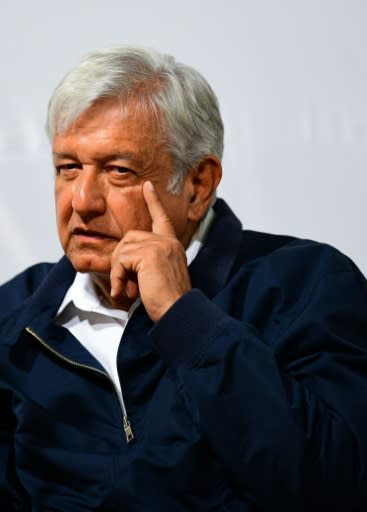Will Mexico's economy tank if leftist wins vote?
The fiery leftist Andres Manuel Lopez Obrador looks increasingly hard to beat in Mexico's upcoming presidential election -- drawing dire warnings from some in the business community that he would wreck Latin America's second-largest economy. The trillion-dollar question facing Mexicans as they prepare to cast their ballots on July 1 is: would he? The sharp-tongued, silver-haired former Mexico City mayor, who has a double-digit lead in most recent opinion polls, is locked in an escalating clash with the business world. After Lopez Obrador said top tycoons do not want him to win because they "don't want to stop stealing" and "think they own Mexico," two prominent business groups took out full-page newspaper ads painting the candidate as a divisive autocrat and threat to the economy. Other detractors warn Lopez Obrador would turn Mexico into the next Venezuela, whose socialist "revolution" has unravelled into economic catastrophe. Lopez Obrador -- widely known by his initials, AMLO -- is trying hard to downplay such fears. But he is also accused of sending mixed messages, depending on who his audience is. The same Lopez Obrador who fires up crowds with talk of fighting the "mafia of power" and overhauling the country's economic model reassuringly tells business leaders he will respect private investment and run a fiscally responsible government. The two-time presidential runner-up says his economic policy would be based on Mexico's economic model of the 1950s to 1970s, known as "stabilizing development." That strategy coincided with a period of rapid economic growth often called the "Mexican miracle." But critics say its principles of state-led development are antiquated and discredited. Not that things are going so well for Mexico in its current free-market economy. So far this century, Mexico's gross domestic product (GDP) has grown an underwhelming two percent per year, on average. There are some bright spots: since Mexico entered the North American Free Trade Agreement (NAFTA) with the United States and Canada in 1994, the country has become a major exporter with a thriving manufacturing sector. But the boom has been isolated, and 53.4 million Mexicans -- 44 percent of the population -- live in poverty. Frustrated at being left behind, and fed up with crime and corruption scandals under President Enrique Pena Nieto, many Mexicans are looking for change. In a country governed for the past 89 years by the parties of his two main rivals -- Ricardo Anaya of the conservative National Action Party (PAN) and Jose Antonio Meade of the ruling Institutional Revolutionary Party (PRI) -- many see Lopez Obrador as the best bet to do things differently. - AMLOnomics - Lopez Obrador says he has a simple solution to kick-start the economy: wipe out the corruption plaguing Mexico, which he estimates sucks up 500 billion pesos (more than $25 billion) a year, and use that money to fund public investment and social programs. Many economists say it is not so simple. "Even if you add up everything that's lost to corruption and embezzlement, you don't get to 500 billion pesos," said Marco Oviedo, an economist at British bank Barclays, who puts the real figure closer to 90 billion pesos. "The numbers don't add up," he said. The candidate's controversial proposals to review the contracts from Pena Nieto's landmark privatization of the energy sector and halt public funding for a new $13-billion airport for Mexico City have also raised investors' eyebrows. Raymundo Tenorio, head of the economics department at the Monterrey Institute of Technology and Higher Education, warned that Lopez Obrador's policies would lead to "financial disorder" that would hurt Mexico's credit. "If this guy becomes president, I'm just hoping he won't follow through on his promises," he said. The respected economist Lopez Obrador has tapped to be his finance minister, Carlos Urzua, dismisses such doomsayers. He has been repeating a soothing mantra in meetings with investors in New York, London and Mexico City: a Lopez Obrador presidency will be one of macroeconomic stability, central bank autonomy, low inflation, a free-floating exchange rate and sensible spending. "We may change some things, but as far as basic economic policy we are even more cautious than the other parties," he said at a recent forum. The business world's warnings appear to be doing little to stop Lopez Obrador in the polls. In fact, for some voters, they may have the opposite effect. "Proposing a change in direction -- that is, to not do the same things we've been doing for the past 30 years -- is (Lopez Obrador's) biggest success," said Cesar Salazar, an economist at the National Autonomous University of Mexico. Mexico's presidential candidate, Andres Manuel Lopez Obrador (in car), who leads most opinion polls, holds with a supporter a sign reading "Let's cure Mexico" Many economists say the economic solutions proposed by Mexican presidential candidate Andres Manuel Lopez Obrador, pictured, are not as simple as he suggests



